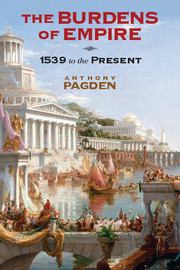Book contents
- Frontmatter
- Dedication
- Contents
- Preface
- Acknowledgements
- Introduction: Anatomy of Empire from Rome to Washington
- 1 Defending Empire: The School of Salamanca and the ‘Affair of the Indies’
- 2 ‘Making Barbarians into Gentle Peoples’: Alberico Gentili on the Legitimacy of Empire
- 3 The Peopling of the New World: Ethnos, Race, and Empire in the Early-Modern World
- 4 Conquest, Settlement, Purchase, and Concession: Justifying the English Occupation of the Americas
- 5 Occupying the Ocean: Hugo Grotius and Serafim de Freitas on the Rights of Discovery and Occupation
- 6 Cambiar su ser: Reform to Revolution in the Political Imaginary of the Ibero-American World
- 7 From the “Right of Nations” to the “Cosmopolitan Right”: Immanuel Kant's Law of Continuity and the Limits of Empire
- 8 “Savage Impulse-Civilized Calculation”: Conquest, Commerce, and the Enlightenment Critique of Empire
- 9 Human Rights, Natural Rights, and Europe's Imperial Legacy
- Bibliography
- Index
Introduction: Anatomy of Empire from Rome to Washington
Published online by Cambridge University Press: 05 March 2015
- Frontmatter
- Dedication
- Contents
- Preface
- Acknowledgements
- Introduction: Anatomy of Empire from Rome to Washington
- 1 Defending Empire: The School of Salamanca and the ‘Affair of the Indies’
- 2 ‘Making Barbarians into Gentle Peoples’: Alberico Gentili on the Legitimacy of Empire
- 3 The Peopling of the New World: Ethnos, Race, and Empire in the Early-Modern World
- 4 Conquest, Settlement, Purchase, and Concession: Justifying the English Occupation of the Americas
- 5 Occupying the Ocean: Hugo Grotius and Serafim de Freitas on the Rights of Discovery and Occupation
- 6 Cambiar su ser: Reform to Revolution in the Political Imaginary of the Ibero-American World
- 7 From the “Right of Nations” to the “Cosmopolitan Right”: Immanuel Kant's Law of Continuity and the Limits of Empire
- 8 “Savage Impulse-Civilized Calculation”: Conquest, Commerce, and the Enlightenment Critique of Empire
- 9 Human Rights, Natural Rights, and Europe's Imperial Legacy
- Bibliography
- Index
Summary
I
Le droit a ses époques
“Pascal”Of all the terms in the political lexicon, “empire” is one of the most elusive and among the most contentious. Achaemenid Persia, Ancient Macedonia, Rome, Parthia Byzantium, Ottoman Turkey, China, Vishanagar, Assyria, Elam, Urartu, Benin, Maori New Zealand, Peru and Mexico, Nazi Germany, the Soviet Union – even the United States, and the European Union (EU) – to name but a few, have all been described as “empires”. What all of these – other than either the United States or the EU – share in common with one another, apart from the obvious fact that they no longer exist, are four things: they were all (relatively) large; they were all believed to be, either actually or potentially, universal; they were all states in which one ethnic or tribal group, by one means or another, ruled over several others; and for the most part, most of them have been acquired by conquest. The belief that a people has an inalienable right to be governed by one of its own own kind, whether real or imagined, – what the anthropologist Marshall Sahlins once called the “quaint Western concept that domination is a spontaneous expression of the nature of society” – is relatively recent and exclusively of European origin. “Eat-me” says the Fijian commoner in deference to his chief, because he knows that all rulership is a form of cannibalism and that the first rule of cannibalism is that no one eats his own kind.
Empires are now no more. But they have always been a more frequent, more extensive, human experience than tribal territories or modern nations have ever been. Rome lasted for some 600 years in the west and for over a millennium longer in the East. The Ottoman Empire lasted for more than 600 years, and the Chinese, although governed by successive dynasties, for more than 2,000. And endurance was not all. Empires also covered far larger areas and included far larger populations than any previous or subsequent state forms.
- Type
- Chapter
- Information
- The Burdens of Empire1539 to the Present, pp. 1 - 44Publisher: Cambridge University PressPrint publication year: 2015

